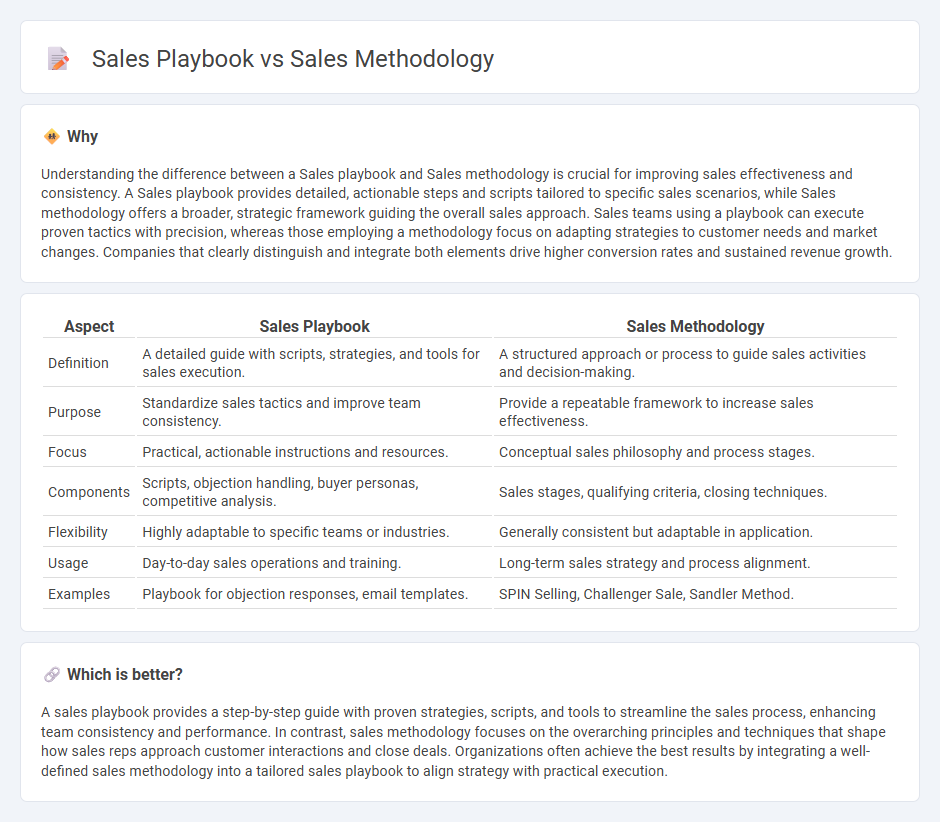
Sales playbooks provide structured, repeatable processes and tools that guide sales teams through specific scenarios to increase efficiency and close rates, while sales methodologies focus on overarching strategies and philosophies such as SPIN Selling or MEDDIC to shape the approach and mindset of sellers. Combining a sales playbook with a tested sales methodology empowers organizations to standardize best practices and adapt to diverse customer needs with precision. Explore how integrating both can transform your sales performance and drive consistent revenue growth.
Why it is important
Understanding the difference between a Sales playbook and Sales methodology is crucial for improving sales effectiveness and consistency. A Sales playbook provides detailed, actionable steps and scripts tailored to specific sales scenarios, while Sales methodology offers a broader, strategic framework guiding the overall sales approach. Sales teams using a playbook can execute proven tactics with precision, whereas those employing a methodology focus on adapting strategies to customer needs and market changes. Companies that clearly distinguish and integrate both elements drive higher conversion rates and sustained revenue growth.
Comparison Table
| Aspect | Sales Playbook | Sales Methodology |
|---|---|---|
| Definition | A detailed guide with scripts, strategies, and tools for sales execution. | A structured approach or process to guide sales activities and decision-making. |
| Purpose | Standardize sales tactics and improve team consistency. | Provide a repeatable framework to increase sales effectiveness. |
| Focus | Practical, actionable instructions and resources. | Conceptual sales philosophy and process stages. |
| Components | Scripts, objection handling, buyer personas, competitive analysis. | Sales stages, qualifying criteria, closing techniques. |
| Flexibility | Highly adaptable to specific teams or industries. | Generally consistent but adaptable in application. |
| Usage | Day-to-day sales operations and training. | Long-term sales strategy and process alignment. |
| Examples | Playbook for objection responses, email templates. | SPIN Selling, Challenger Sale, Sandler Method. |
Which is better?
A sales playbook provides a step-by-step guide with proven strategies, scripts, and tools to streamline the sales process, enhancing team consistency and performance. In contrast, sales methodology focuses on the overarching principles and techniques that shape how sales reps approach customer interactions and close deals. Organizations often achieve the best results by integrating a well-defined sales methodology into a tailored sales playbook to align strategy with practical execution.
Connection
A sales playbook serves as a practical guide that implements a sales methodology by outlining specific strategies, processes, and best practices for sales teams to follow. The sales methodology provides the overarching framework and principles--such as SPIN Selling or Solution Selling--that shape the approach and techniques included in the playbook. By aligning the playbook with the chosen sales methodology, organizations ensure consistent execution, improved pipeline management, and higher close rates.
Key Terms
Sales Methodology:
Sales methodology refers to the structured framework and strategic approach sales teams use to engage prospects, qualify leads, and close deals effectively. It encompasses repeatable processes grounded in proven techniques like SPIN Selling, Solution Selling, or Challenger Sale, designed to optimize sales performance. Explore more to understand how implementing the right sales methodology can drive consistent revenue growth and improve team alignment.
Solution Selling
Solution Selling is a sales methodology centered on identifying customer needs and providing tailored solutions to address specific business challenges, emphasizing consultative dialogue and value-driven outcomes. A sales playbook, by contrast, serves as a tactical guide that codifies best practices, scripts, objection handling, and process workflows aligned with the Solution Selling approach to ensure consistent execution across sales teams. Explore more to understand how integrating a sales playbook with Solution Selling can drive revenue growth and sales effectiveness.
SPIN Selling
SPIN Selling is a sales methodology centered on understanding customer needs through Situation, Problem, Implication, and Need-Payoff questions, enabling tailored solutions that drive deal closure. A sales playbook complements this by providing structured strategies, scripts, and best practices that operationalize the SPIN Selling framework across sales teams for consistent execution. Explore how integrating SPIN Selling into your sales playbook can enhance performance and conversion rates.
Source and External Links
The 7 best sales methodologies: how to choose the right one - Zendesk - The Sandler methodology prioritizes qualification over closing, focuses on collaborative questioning to guide customers to their own conclusions, and encourages walking away from deals that are not a good fit, fostering long-term, trust-based relationships.
12 Best Sales Methodologies & Customer-Centric Selling - HubSpot - SPIN Selling, developed by Neil Rackham, is a questioning-based approach that helps sales reps uncover buyer pain points by structuring conversations around Situation, Problem, Implication, and Need-payoff, thereby increasing closure rates by addressing the real needs of prospects.
16 Proven Sales Methodologies for Successful Teams - Highspot - Conceptual Selling, created by Heiman and Miller, focuses on understanding the buyer's concept of a solution through deep discovery and tailored questioning, aiming to align the product's capabilities with the customer's desired outcomes and strategic goals, which works best for complex, integrated products.
 dowidth.com
dowidth.com